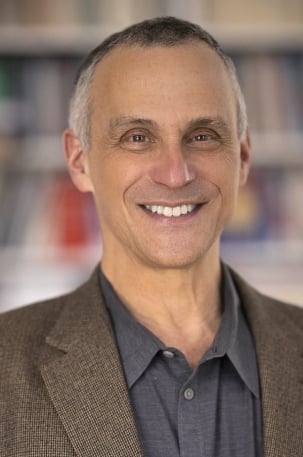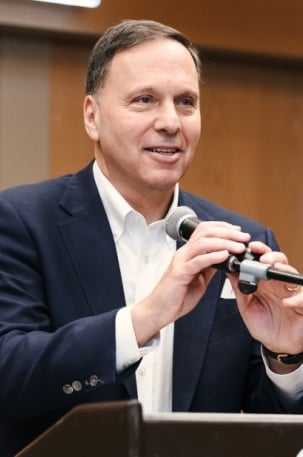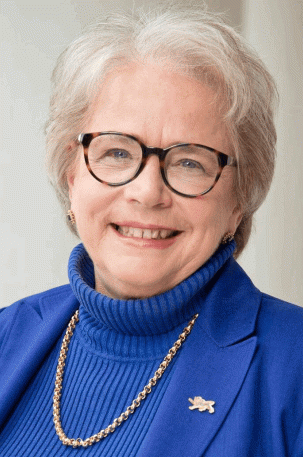Jewish school presidents on navigating protests, criticisms
Tense moments abounded on the most up-to-date Congressional listening to centered on antisemitism on American school campuses. As coverage makers lambasted the college presidents current about their dealing with of campus protests over the Israel-Hamas battle, the presidents sat quietly ready to reply.
Congresswoman Lori Chavez-DeRemer, an Oregon Republican, accused the group of being “straight accountable” for the latest rise in antisemitism on school campuses, evaluating the present local weather to the lead-up to the Holocaust, and lectured them on Jewish historical past.
“To everybody who will see this, I ask that you simply go to the Holocaust museum right here in D.C.,” she mentioned through the Home Training and Workforce Committee listening to final month. “I would like you to kneel down and contact the stone which paved the grounds of Auschwitz. I would like you to see over the numerous sneakers of murdered Jews.”
These deaths had been “enabled by international tradition, indifference and hatred, a tradition which every of us has a job in both enabling or ending” she mentioned addressing every of the presidents by identify. “I might remind you … of who you’re, you’re leaders of tradition. At this current second, you’ve deserted that position. I hope you reclaim it as a result of we’ll definitely be watching.”
That two of the three presidents on the recent seat had been Jewish appeared misplaced on the congresswoman, who shouldn’t be Jewish. Gene Block, chancellor of the College of California, Los Angeles, had spoken in his opening remarks about his personal experiences with antisemitism, and Michael Schill, president of Northwestern College, has described himself as a descendant of Holocaust survivors who has kin who fled to Israel. (The president of the Massachusetts Institute of Expertise, Sally Kornbluth, can be Jewish and was additionally introduced earlier than Congress for the first listening to on this situation in December.)
The campus protests and the ensuing Congressional hearings have put all school and college presidents on discover, however Jewish presidents discover themselves in a uniquely difficult place the place many really feel they will’t win.
They’ve been pressured to navigate points which are deeply private to a few of them and rooted in their very own identities and upbringing, whereas being thrust into the highlight of nationwide discussions about campus antisemitism and violence in Gaza. They’ve been accused by policymakers, college members, donors, college students and college students’ dad and mom of both fostering antisemitism—a type of discrimination with which some presidents really feel intimately acquainted—or failing to guard educational freedom and free speech, or each.
Additionally they have their very own myriad opinions on the battle, how impartial or open to be with their views, and the way their identities might have an effect on how their choices are perceived.
Beneath are a few of these presidents’ ideas on navigating this notably troublesome private {and professional} second.
Michael Roth, president of Wesleyan College
Roth, who has led the personal Connecticut establishment for 17 years, mentioned a few of his first reminiscences of feeling Jewish weren’t the spiritual or cultural rituals he’s come to worth later in life however cases of antisemitism he encountered early in life that caught with him, akin to when an elementary college classmate referred to as him a “kike head” and “silly Jew.”

Roth is disturbed however not stunned antisemitism nonetheless exists. He additionally doesn’t imagine pro-Palestinian protests are inherently antisemitic. He has brazenly referred to as the violence in Gaza a “humanitarian disaster” and referred to as for a ceasefire in March. Wesleyan leaders additionally met with protesters who arrange an encampment on campus and had clear discussions with them concerning the college’s investments, although Roth is brazenly towards a boycott of Israeli corporations. The college’s leaders and the protesters reached a profitable settlement to shut down the encampment in Might.
Roth suspects some onlookers may make assumptions about his opinions on the battle as a result of he’s Jewish. He’s additionally taken some warmth for his choices from folks on and off campus, together with from his personal Jewish neighborhood, which may be agonizing.
“To be referred to as an antisemite by different Jews, I imply, it’s ludicrous, but it surely’s arduous for me to simply snicker it off,” he mentioned.
He’s additionally met with Jewish college students and mentioned the “connectivity” of a shared identification creates a sure comradery and belief, however on the identical time, “they had been actually indignant with me.”
“I assumed they needed to construct resilience towards phrases they don’t like or chants they don’t like,” he mentioned. “And I used to be not going to attempt to censor these chants, even when I don’t like them.”
Ronald D. Liebowitz, president of Brandeis College
Brandeis, situated in Waltham, Mass., was based by American Jews in 1948 at a time when some universities sought to restrict Jewish enrollment. That Jewish historical past provides the campus a distinct historic identification and tradition than most campuses, mentioned Liebowitz, who was previously president of Middlebury Faculty, in Vermont. A couple of third of Brandeis’s roughly 3,500 undergraduates are Jewish, as are at the least 60 % of alumni.

Ronald D. Liebowitz
Liebowitz believes Brandeis’s Jewish legacy prompted him to be considerably “bolder” in his strategy to the present battle than he might need been at Middlebury.
He made the choice to revoke the constitution of the Brandeis chapter of College students for Justice in Palestine in November as a result of he was involved concerning the nationwide group’s rhetoric on social media, which he described as “harassing and threatening.” He obtained pushback from some college members and college students for that call, however he believes that Brandeis, as a personal college, typically has to restrict free speech to create a greater studying surroundings. He mentioned college students are welcome to start out different pro-Palestinian teams.
He added that he’s heard from Palestinian and Muslim college students that “they really feel invisible,” as they see surges of activism and help for Palestinians on different campuses however much less so on their campus. He mentioned it’s “crucial” that these college students additionally really feel “a part of the establishment.”
“That’s one thing we should work on,” he mentioned.
He has his personal ties to Judaism and Israel. His grandparents fled pogroms in what was then Russia, and he was raised in a Conservative Jewish dwelling. His grandfather gifted him a visit to Israel after his senior yr of school, and he and his spouse and kids have been again many instances since. However he mentioned he tries to keep up a pointy divide between his private connection to those points and his position as president.
He famous that, even when he didn’t have Jewish roots or a private tie to Israel, to be an efficient president, he must be “very cognizant and delicate to the alumni physique,” as he would at any college, “and to the place Brandeis sits inside American larger schooling.”
R. Barbara Gitenstein, president emerita of the Faculty of New Jersey
Gitenstein was the primary Jewish president of the faculty and led it for 19 years till 2018. She mentioned coping with any campus situation that has some type of private resonance is a problem for presidents.

R. Barbara Gitenstein
She suspects that the inner turmoil some Jewish school presidents are experiencing shouldn’t be dissimilar to that of some Black presidents within the aftermath of the killing of George Floyd or how LGBTQ+ campus leaders may really feel when homophobic incidents occur on their campuses. She added that Muslim school presidents are additionally probably combating methods to navigate the present second.
“These should not challenges which are a shock to different presidents who’ve completely different identities,” she mentioned.
She mentioned her Jewish values, together with an emphasis on social justice, influenced how she went about her management position. On the identical time, she believes presidents should make choices primarily based on what they suppose is finest for “the complete establishment,” no matter their private identities. To her, which means strong communication with college students to elucidate typically fraught choices, and never resorting to calling police on protesters except there’s a really clear menace of violence. She discovered it arduous to look at Congress criticize presidents for having dialogue with their campus protesters, and in some instances, reaching agreements to deal with a few of their issues.
“I don’t suppose that’s a flaw,” she mentioned. “That’s a top quality of power.”
She sees Jewish presidents as having a job to play in modeling “resilience” to Jewish college students as they hear all types of feedback concerning the Israeli-Palestinian battle from classmates, together with some who might say hurtful issues with out desiring to or who might not know when their rhetoric has veered into antisemitism.
“I’m positive there are [Jewish] college students who’re feeling uncomfortable and frightened,” she mentioned. Jewish presidents can assist them by telling them, “‘Look, I felt that approach earlier than. Listed below are some experiences that I went by means of, and I survived.’”
“I’m not saying simply to simply accept it,” she mentioned. However “simply because somebody says one thing terrible doesn’t imply it’s a must to internalize it.”
Gene Block, chancellor of the College of California, Los Angeles
Block, who’s retiring this yr, careworn in his opening remarks earlier than Congress in Might that the difficulty of campus antisemitism struck near dwelling.
“Belief me, I perceive their ache,” Block mentioned of UCLA Jewish college students disturbed by sure rhetoric and pictures associated to the battle voiced and displayed on campus. “I’ve lived it myself.”
He spoke of rising up in a Jewish household that included Holocaust victims and survivors. He talked about watching neo-Nazis march by means of Charlottesville, Virginia, together with “exterior the synagogue the place my kids had been referred to as to the Torah” when he was the provost of the College of Virginia. He additionally described seeing artwork of himself “with exaggerated facial options that was paying homage to caricatures of Jews through the Nazi period” at UCLA.
Nevertheless, he emphasised that UCLA has a historical past of peaceable protest and that “being an American means typically being requested to tolerate offensive and even hateful speech protected by our Structure.”
He famous that he left the college’s encampment alone till violence broke out between protesters and counterprotesters, at which level he referred to as the police.
He mentioned college students shouldn’t be threatened or discriminated towards primarily based on their identities or beliefs, however concurrently, educational freedom and free speech want defending.
“It’s not all the time simple to strike an ideal stability, but it surely should all the time be our purpose,” he mentioned.
Michael Schill, president of Northwestern College
Schill, president of the personal establishment in Illinois since 2022, has been open about his Jewish identification and about how troublesome it has been to be accused of aiding the unfold of antisemitism. He skilled backlash from Jewish teams and college students and was requested to participate within the Congressional listening to final month, after reaching an settlement with pro-Palestinian scholar protesters to take away their encampment in trade for sure concessions.
“I’m a proud Jew who practices a lot of our rituals,” he wrote in an op-ed within the Chicago Tribune in Might, earlier than his listening to. “Being Jewish is core to my identification, and I grew up with a love for Israel, which stays right now. My household has skilled antisemitism, and so claims by some that I’ve collaborated with antisemitic folks really feel like private affronts.”
He wrote that among the many Jewish values he admires is a “tradition of rationality and tolerance” which he believes dovetails nicely with “the core worth of universities to interact in dialogue and search to bridge variations peacefully.” He noticed the deal he struck with scholar protesters as a manifestation of these values. Protesters took down their tents, and in trade, the college promised to be extra clear about its investments, help two Palestinian visiting college members and 5 Palestinian college students to return to Northwestern as part of its “Students at Threat” program and create a home for Center Jap, North African and Muslim college students.
He mentioned eradicating the encampment, which was seen as “a supply of antisemitic intimidation” by many Jewish college students, allowed peaceable demonstrations to proceed.
“We stand able to start disciplinary proceedings towards anybody who breaks our guidelines or engages in antisemitic or anti-Muslim conduct,” he famous.
The settlement “was doable as a result of we sought to comply with a set of rules, a lot of which I might argue are core to the tenets of Judaism,” Schill wrote.

